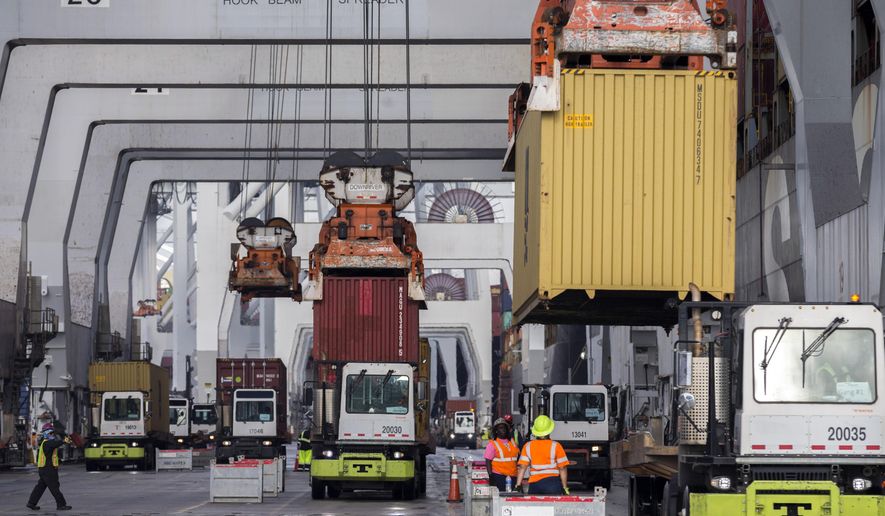A top White House official on Wednesday said supply chain disruptions could continue into 2022 because the omicron variant could impact the supply networks both overseas and in the U.S.
“It’s hard to tell that the supply chain pressures have peaked,” White House Port Envoy Jon Porcari told reporters. “I think what is clear is that the pandemic laid bare what was the underlying reality, which was that the supply chain was stressed even before the pandemic.”
Mr. Porcari’s statement contradicts President Biden’s declaration that last month that supply chain failures and widespread consumer goods shortages forecast for the 2021 holiday buying season had not materialized.
“The much-predicted crisis didn’t occur. Packages are moving, gifts are being delivered, shelves are not empty,” Mr. Biden said just days before the Christmas holiday.
Mr. Porcari echoed the president’s assessment that the holiday shipping season was a success. He said consumers received between 97% and 99% of their packages on time or with minimal delays from FedEx, UPS and the U.S. Postal Service.
But Mr. Porcari said the omicron variant still poses a threat, adding that its impact may continue to unfold. So far, Mr. Procari said, omicron has only had a short-term impact on the supply chain.
“There have been some increased outages from longshore workers and others,” he said. “So far that has not disrupted operations. As you saw early in the pandemic, there are procedures in place in terms of personal protective equipment and safety measures for the workers at the ports and those will be ratcheted up as needed.”
Mr. Porcari also announced a series of actions the administration and private sector shipping companies are planning to alleviate future supply chain disruptions.
For example, the Ports of Los Angeles and Long Beach will begin fining shipping companies at the end of January for leaving empty containers at the ports. Mr. Porcari said the move will, open up space at the docks and increase the velocity in which goods will move.
The administration said in a fact sheet that shipping containers have yet to pick up “tens of thousands” empty containers, making it “harder for trucks to maneuver on the docks.”
The White House also announced on Wednesday that it has reached labor agreements that have enabled the Ports of Los Angeles and Long Beach to process 14% higher volume than the previous high point in 2018.
Retail inventories were up 3.4% from 2020, during the height of the pandemic, and containers waiting more than nine days to be unloaded have increased 39% since the start of November, according to the White House.
But on-shelf availability has dropped about 3% from before the pandemic.
Mr. Porcari sidestepped questions about the trucker driver shortage and whether federal vaccine mandates could exacerbate the issue, merely saying all workers should get vaccinated.
Last month, trucking officials told a House committee that vaccine hesitancy is sidelining workers. There were about 80,000 open truck driver jobs in the U.S. before Mr. Biden’s vaccine mandate for businesses was proposed last year.
It is unclear how many truckers have walked off the job or refused runs because of the vaccine mandate.
• Jeff Mordock can be reached at jmordock@washingtontimes.com.




Please read our comment policy before commenting.